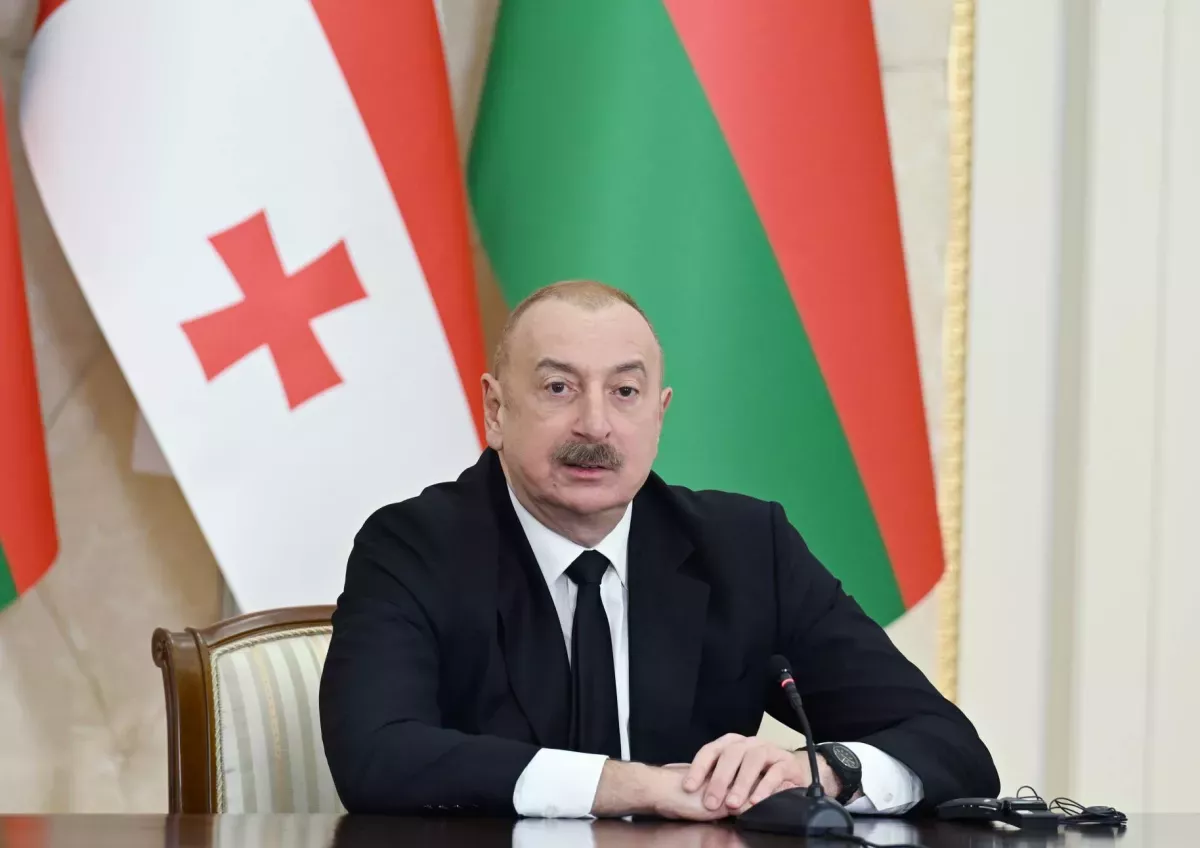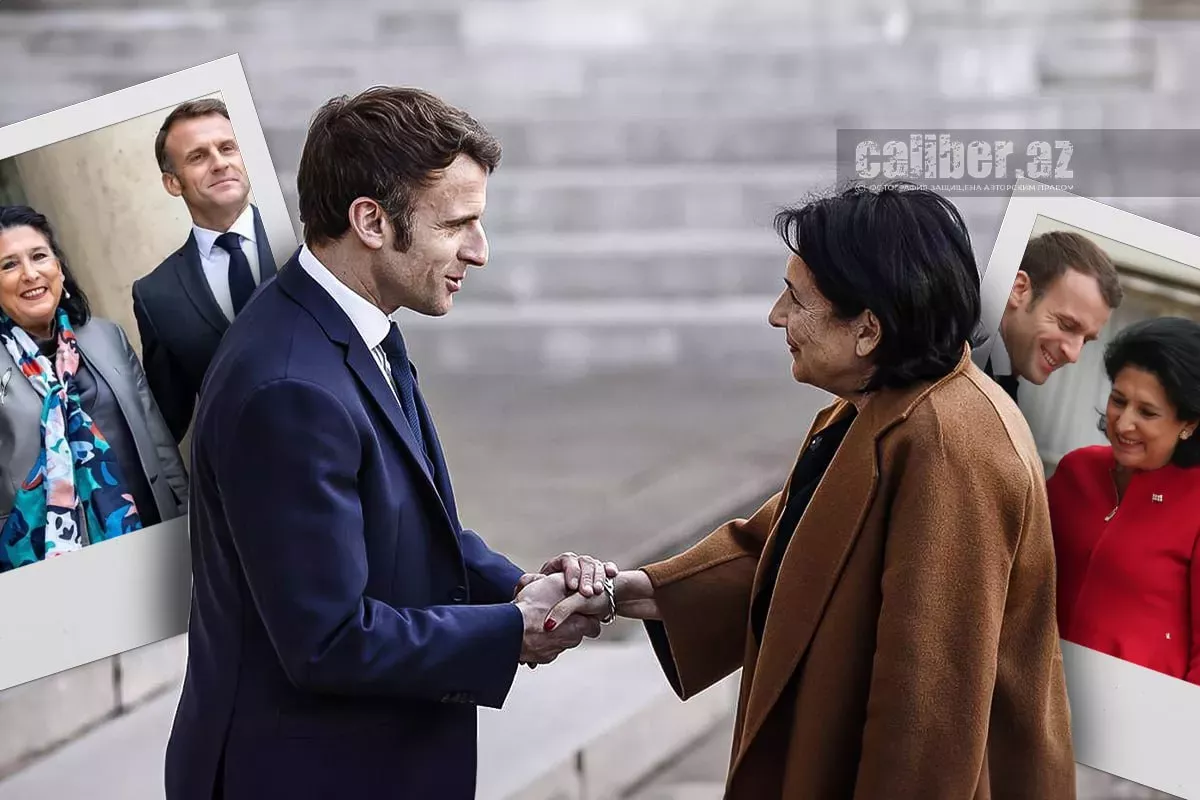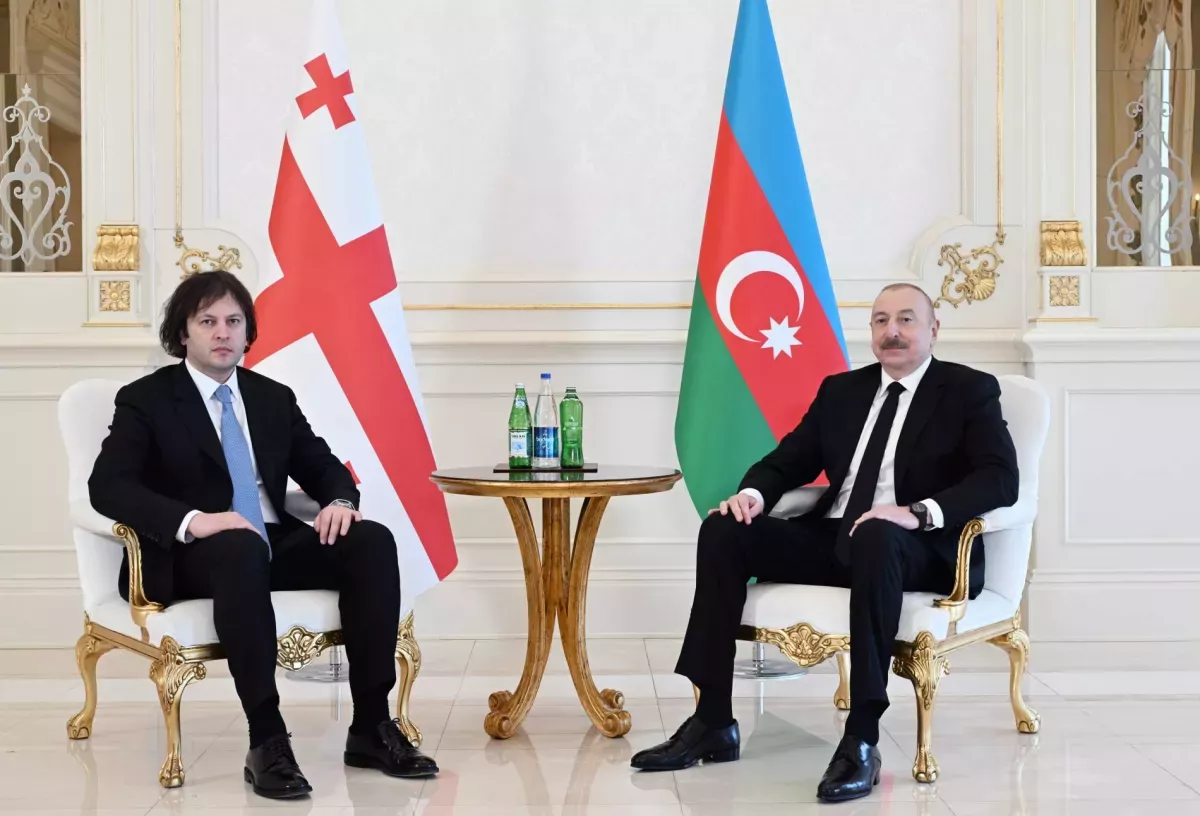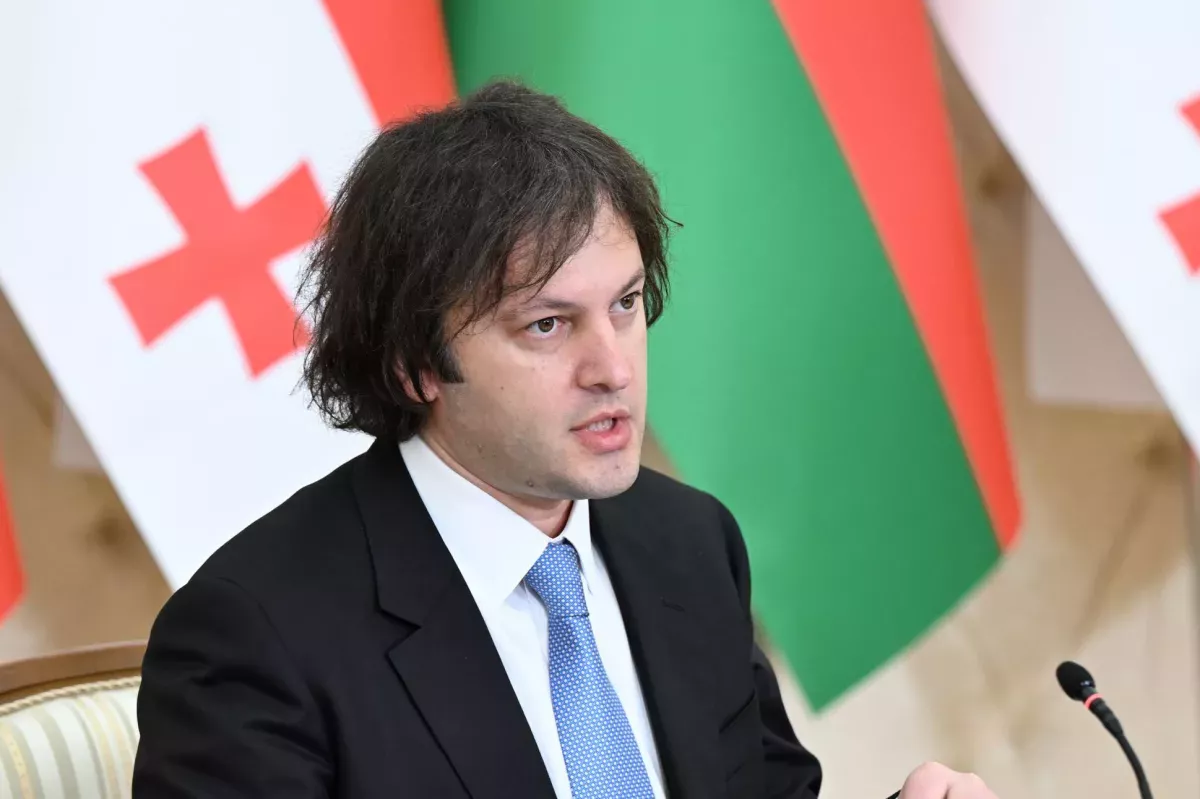Georgian PM’s visit to Azerbaijan represents symbol of growing regional influence Sovereignty, Stability, Good Neighbourliness
On January 17, Georgian Prime Minister Irakli Kobakhidze made his first official visit to Azerbaijan following the parliamentary elections and the formation of the new government. This is highly symbolic and demonstrates which country is Georgia's most important neighbour and strategic partner.
The visit was made within the 10th Intergovernmental Commission on Economic Cooperation between Georgia and Azerbaijan. The delegation, led by Prime Minister Irakli Kobakhidze, also included First Deputy Prime Minister and Minister of Economy and Sustainable Development Levan Davitashvili, Foreign Minister Maka Botchorishvili, Minister of Environmental Protection and Agriculture David Songulashvili, Minister of Culture Tinatin Rukhadze, and Head of the Government Administration Levan Zhorzholiani.
Georgian Foreign Minister Maka Botchorishvili arrived in Baku on January 16, marking her first official foreign visit in her current role.
“Azerbaijan is among Georgia's top five economic partners. Together, we are implementing vital and major projects that are significant not only for us but for the entire region,” Georgian Foreign Minister Maka Botchorishvili said.
During the meeting between Ilham Aliyev and Irakli Kobakhidze, the importance of the friendship between Azerbaijan and Georgia was also emphasized.
“Our peoples have lived in an atmosphere of friendship, good-neighborliness, and brotherhood for centuries. These traditions continue to thrive today. Today, Georgia-Azerbaijan relations are progressing successfully in all areas. I believe that our political relations can serve as an example for all our neighbors,” the Azerbaijani president said in a statement for the journalists after his one-on-one meeting with Georgian Prime Minister Irakli Kobakhidze.
President Aliyev emphasized that there have been positive results in the economic cooperation between the two countries as well.
“Azerbaijan has invested $3.6 billion in the Georgian economy. Of course, this demonstrates that the successful economic policy of your government, the attraction of investments, and the positive investment climate in Georgia encourage all investors. Azerbaijani investors, in particular, are investing in Georgia with great enthusiasm. Of course, cooperation between the two countries in the energy sector is of particular importance both for our countries and for a larger, wider geography. The oil and gas projects we are implementing together today form the basis of the energy security of many countries. Suffice it to say, Azerbaijan currently exports its natural gas to 11 countries through Georgia, and exports are increasing year after year. Last year, the figure reached 25 billion cubic meters, and 10 percent of this - 10 percent of our total exports - falls on Georgia,” President Aliyev said.

However, the cooperation between Azerbaijan and Georgia goes beyond the economy and energy sectors. To understand the significance of Prime Minister Irakli Kobakhidze's current visit to Baku as the head of Georgia's government from the victorious political Georgian Dream party following the parliamentary elections of October 26, 2024, it is crucial to analyze recent events. About five and a half years ago, in summer 2019, Kobakhidze also visited Baku, but at that time, he was serving as the speaker of the Georgian parliament. His visit was scheduled around his participation in the 53rd session of the Parliamentary Assembly of the Black Sea Economic Cooperation (PABSEC).
However, Kobakhidze was forced to abruptly cut short his visit to Baku and return to Tbilisi, where, under the influence of the West, which was dissatisfied with the independence of the Georgian Dream party, the first attempt at a Maidan and colour revolution was made. On June 20, 2019, protests began outside the parliament of Georgia, escalating into unrest and an attempted storming of the building.
The unrest was sparked by the visit of State Duma Member Sergey Gavrilov to Tbilisi. He unintentionally sat in the vacant seat of the speaker of the Georgian Parliament while opening a session of the Interparliamentary Assembly on Orthodoxy. This incident angered the opposition and served as a signal for the uprising. The attempt to storm the Parliament building in Tbilisi was successfully prevented at the time.
However, the government made a temporary concession. Kobakhidze resigned, but remained a staunch advocate for defending Georgia's sovereignty and national interests. Today, it is clear why the West attempted to organize a Maidan in Georgia back in 2019. In 2018, the West succeeded in orchestrating a Maidan-style revolution in Armenia, bringing to power a figure backed by the US and France, Nikol Pashinyan. Without wasting any time, Pashinyan began severing ties with Russia, particularly by undermining it within the CSTO. However, Armenia during Pashinyan's period of power immediately faced a problem: continuing the occupation of Karabakh was unimaginable without external military assistance, and the deteriorating relationship with Russia left no hope for Russia’s support.
The Armenian military leadership and its new Western backers found themselves in need of a "military corridor" through Georgia, through which they hoped to receive Western assistance in the event of a new war over Karabakh. However, the government, led by Irakli Kobakhidze, and represented by Georgian Dream party members opposed turning Georgia into a pawn in the geopolitical games of Washington, Paris, and Yerevan. This was likely a significant factor in the attempt to overthrow the Georgian authorities through a Maidan, especially as during the unrest in Tbilisi in June 2019, Armenian citizens close to Pashinyan’s party were detained.
The failure of the first attempt at a Maidan in Tbilisi in 2019 (as well as subsequent attempts) had immense significance for the South Caucasus region. The preservation of Georgia's sovereignty meant that during the second Karabakh war in 2020, despite all the pressure, the Armenian lobby and France were unable to secure permission for the transit of weapons to Armenia through Georgian territory. As a result of the war, Karabakh was liberated from Armenian occupation, setting a precedent and giving Georgia hope for the eventual liberation of its own occupied territories—Abkhazia and the Tskhinvali region.

In 2024, the West attempted once again to orchestrate a revolution and a Maidan in Georgia, but it has recently become clear that these efforts have failed. Kobakhidze arrived in Baku as the head of government from the victorious Georgian Dream party, which secured this victory despite unprecedented external pressure and attempts to destabilize the situation in Georgia. In essence, the current meeting between President Ilham Aliyev and Prime Minister Irakli Kobakhidze in Baku not only is a gathering of strategic partners and neighbours but also of victors. Back in 2019, Azerbaijan’s Karabakh was under Armenian occupation, and Georgia had yet to experience defending its national sovereignty in the face of Western pressure and provocative attempts at a coup.
Not only de jure but also de facto, Karabakh is Azerbaijan, and Georgia has strengthened its sovereignty. Both Georgia and Azerbaijan are key countries in the strategically vital Middle Corridor, which links the East and West of Eurasia. The importance of communications and the Middle Corridor project was particularly emphasized during the meeting between President Aliyev and Kobakhidze.

“At the same time, today, during a private conversation, we discussed the connectivity and the Middle Corridor project. Our countries also act as close partners here. I am sure that coordinated activities of our relevant institutions will successfully complete this project. Of course, we need to be in contact with many neighbors here, and we have these contacts. This is a project that covers a large geography, and again, Georgia and Azerbaijan are successfully playing the role of a bridge between Europe and Asia here. I know that a project to expand transport infrastructure is being implemented in Georgia. These projects are also underway in Azerbaijan, including the project to digitize transport infrastructure. So by carrying out this work in parallel, we are, of course, providing invaluable services to both our countries and peoples, as well as our neighbors. In all other areas, we can only rejoice at our successes. Given the time constraints, we will discuss other issues in a broader format today. I can also say one thing: the victory of your party is of particular importance for the future stability of the South Caucasus, and we are happy about this victory as your friends and brothers. We wish your government continued successes in its activities,” President Aliyev said.

“I would like to express my gratitude to you for your very sincere hospitality. I would also like to thank you for your congratulations on the victory of our party. It is important for ensuring stability and security in our region and for the relations between our countries. This is of exceptional importance. You are a unique leader in the region and a role model for us. You are leading your country by protecting the interests of your state. It gives me great honor and satisfaction to be here today,” Kobakhidze said.
It is not a coincidence that President Aliyev placed such emphasis on the victory of the Georgian Dream party in the elections and the strengthening of its position in Georgia. Today, this party ensures the protection of national interests and prevents the country from becoming a puppet of external forces. Azerbaijan is keen to build strong, neighbourly relations with such a sovereign and dynamically developing Georgia—actively participating in crucial global projects like the Middle Corridor.
Georgian political analyst Vladimir Tskhvediani’s exclusive article for Caliber.Az








